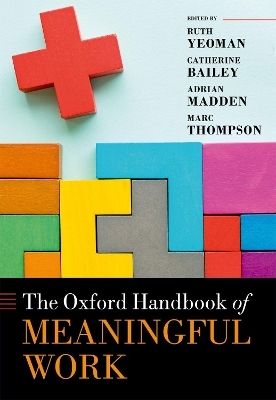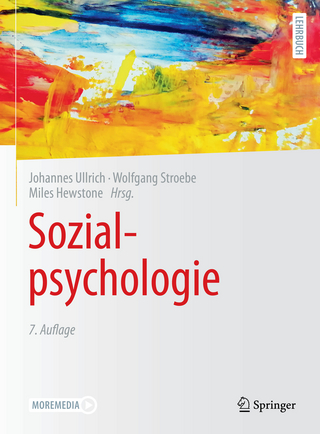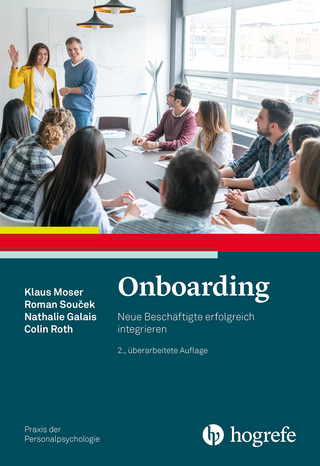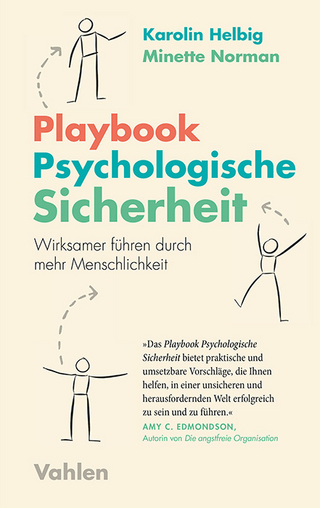
The Oxford Handbook of Meaningful Work
Oxford University Press (Verlag)
978-0-19-878823-2 (ISBN)
The Oxford Handbook of Meaningful Work examines the concept, practices and effects of meaningful work in organizations and beyond. Taking an interdisciplinary approach, this volume reflects diverse scholarly contributions to understanding meaningful work from philosophy, political theory, psychology, sociology, organizational studies, and economics.
In philosophy and political theory, treatments of meaningful work have been influenced by debates concerning the tensions between work as unavoidable and necessary, and work as a source of self-realization and human flourishing. This tension has come into renewed focus as work is reshaped by technology, globalization, and new forms of organization. In management studies, much empirical work has focused on meaningful work from the perspective of positive psychology, but more recent research has considered meaningful work as a complex phenomenon, socially constructed from interactive processes between individuals, and between individuals, organizations, and society. This Handbook examines meaningful work in the context of moral and pragmatic concerns such as human flourishing, dignity, alienation, freedom, and organizational ethics.
The collection illuminates the relationship of meaningful work to organizational constructs of identity, belonging, callings, self-transcendence, culture, and occupations. Representing some of the most up to date academic research, the editors aim to inspire and equip researchers by identifying new directions and methods with which to deepen scholarly inquiry into a topic of growing importance.
Ruth Yeoman is a Fellow at Kellogg College, University of Oxford, where she leads a range of research projects applying meaningfulness and mutuality to work, organizations, and systems. Projects include 'The Meaningful City' and 'Values to Shared Value Creation in Sustainable Supply Chains'. For the Big Innovation Centre in London she led a collaboration including the Bank of England and the Office of National Statistics, investigating intangible assets and national wealth creation. Forthcoming publications include Ethical Organising: Meaningfulness and Mutuality in Organisational Design, to be published by Routledge in their Business Ethics series. Katie Bailey is Professor of Work and Employment at King's Business School, King's College London. She has a PhD from London Business School and has held appointments there and at the Universities of Sussex, Kent, and Kingston. She is a Fellow of the Academy of Social Sciences. Her research focuses on meaningful work, temporality, employee engagement, and strategic human resource management, and she has published widely on these topics in leading scholarly and practitioner journals. Publications include the second edition of Strategic Human Resource Management, published by Oxford University Press. Adrian Madden is an Associate Professor of Organisational Behaviour at the University of Greenwich Business Faculty, where he is also Director of the Leadership & Organisational Behaviour research group. He has worked at the Universities of Sussex and Kent and previously worked in central government policy. Adrian's main research interests are meaningful work, time and organisations, and entrepreneurialism in the informal economy. Marc Thompson is a Senior Fellow in Strategy and Organisation, Saïd Business School, University of Oxford, and Official Fellow, Green Templeton College, University of Oxford. His research interests have covered workplace change, high performance work systems, performance pay, meaningful work, and strategic renewal and innovation. He held posts in Sussex University and the London School of Economics before joining Oxford. He teaches in various degree and custom executive programmes, and is academic director of the Executive Masters, Consulting and Coaching for Change programme HEC/ University of Oxford.
Part I: The Philosophy of Meaningful Work
1: Joanne B Ciulla: The Moral Conditions of Work
2: Norman E. Bowie: Dignity and Meaningful Work
3: Keith Breen: Meaningful Work and Freedom: Self-Realization, Autonomy, and Non-Domination in Work
4: Ron Beadle: Work, Meaning, and Virtue
5: Todd S. Mei: Work and the Meaning of Being
6: Neal Chalofsky and Elizabeth Cavallaro: To Have Lived Well: Well-Being and Meaningful Work
Part II: Processes of Meaningfulness
7: Christopher Michaelson: Do We Have to Do Meaningful Work?
8: Nancy Harding: Identity and Meaningful/Meaningless Work
9: Adrian Madden and Catherine Bailey: Self-Transcendence and Meaningful Work
10: Tatjana Schnell, Thomas Höge, and Wolfgang G. Weber: 'Belonging' and Its Relationship to the Experience of Meaningful Work
11: Laura Boova, Michael G. Pratt, and Douglas A. Lepisto: Exploring Work Orientations and Cultural Accounts of Work: Towards a Research Agenda for Examining the Role of Culture in Meaningful Work
12: Michael F. Steger: Meaning in Life and In Work
Part III: The Experience of Meaningful Work
13: Ruth Simpson, Natasha Slutskaya, and Jason Hughes: Meanings and Dirty Work: A Study of Refuse Collectors and Street Cleaners
14: Carol L. Pavlish, Roberta J. Hunt, Hui-wen Sato, and Katherine Brown-Saltzman: Finding Meaning in the Work of Caring
15: Rebecca Taylor and Silke Roth: Exploring Meaningful Work in the Third Sector
16: Ryan D. Duffy, Jessica England, and Bryan J. Dik: Callings
17: Brad Shuck: Does My Engagement Matter?: Exploring the Relationship Between Employee Engagement and Meaningful Work in Theory and Practice
18: Heather Hofmeister: Work Through a Gender Lens: More Work and More Sources of Meaningfulness
19: Dennis Tourish: Leadership and Meaningful Work
Part IV: Contexts and Boundaries of Meaningful Work
20: Douglas R. May, Jiatian (JT) Chen, Catherine E. Schwoerer, and Matthew D. Degg: Fostering the Human Spirit: A Positive Ethical Framework for Experiencing Meaningfulness at Work
21: Duncan Gallie: Direct Participation and Meaningful Work: The Implications of Task Discretion and Orgnizational Participation
22: Matthew Hall: Accounting for Meaningful Work
23: Evgenia I. Lysova: Meaningful Work and Family: How Does the Pursuit of Meaningful Work Impact One's Family?
24: Marjolein Lips-Wiersma: Does Corporate Social Responsibility Enhance Meaningful Work? A Multi-Perspective Theoretical Framework
25: Sebastiaan Rothmann, Laura Anne Weiss, and Johannes Jacobus Redelinghuys: Cultural, National and Individual Diversity and their Relationship to the Experience of Meaningful Work
26: Marc Thompson: Bringing Political Economy Back-in: A Comparative Institutionalist Perspective on Meaningful Work
27: Ruth Yeoman: The Meaningful City: Towards a Theory of Public Meaningfulness, City Institutions and Civic Work
| Erscheinungsdatum | 17.01.2019 |
|---|---|
| Reihe/Serie | Oxford Handbooks |
| Verlagsort | Oxford |
| Sprache | englisch |
| Maße | 171 x 246 mm |
| Gewicht | 1102 g |
| Themenwelt | Geisteswissenschaften ► Psychologie ► Arbeits- und Organisationspsychologie |
| Medizin / Pharmazie ► Medizinische Fachgebiete ► Psychiatrie / Psychotherapie | |
| Wirtschaft ► Betriebswirtschaft / Management ► Planung / Organisation | |
| Wirtschaft ► Betriebswirtschaft / Management ► Unternehmensführung / Management | |
| ISBN-10 | 0-19-878823-1 / 0198788231 |
| ISBN-13 | 978-0-19-878823-2 / 9780198788232 |
| Zustand | Neuware |
| Informationen gemäß Produktsicherheitsverordnung (GPSR) | |
| Haben Sie eine Frage zum Produkt? |
aus dem Bereich


